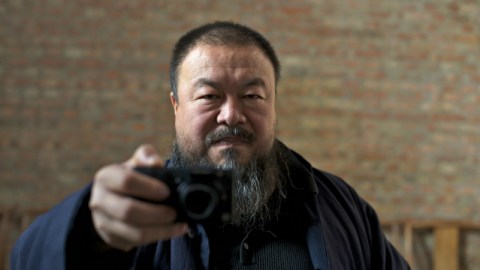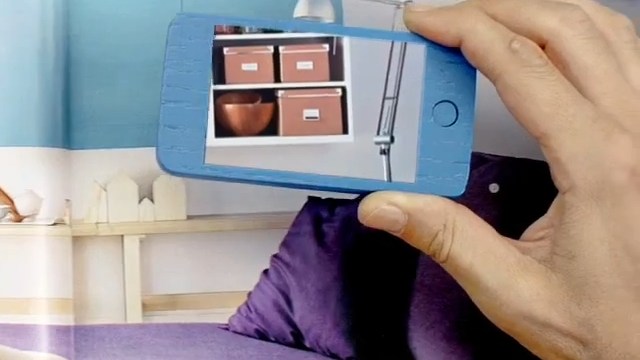F*** You, Motherland – Ai Weiwei’s Mission to Save China From Herself

“Freedom is a powerful thing. Once you’ve experienced it in your heart, no one can take it away from you. Then you can be more powerful than an entire country.”
– Ai Weiwei
On screen, China’s most prominent and politically outspoken artist is disarmingly like a big, benevolent bear. In director Alison Klayman’s powerful new documentary Never Sorry, Ai Weiwei moves slowly and deliberately, with a strange mixture of gravity and lightness – whether subverting the Chinese government’s efforts to cover up the deaths of thousands of children beneath the rubble of shoddily built public schools in the 2008 Sichuan earthquake, or making silly faces at the camera.
Like a bear, he’s dangerous when provoked. And the oppression, corruption, and hypocrisy of the ruling party in Beijing keep him in a more or less perpetual state of war. It’s a culture war, fought mainly with words and images, but no less deadly for that.
Ai inhabits a sprawling, serene studio compound in Beijing, along with his wife and 40 cats. Early in the film he observes that out of 40 cats, only one has taught itself how to open a door. “What if I’d never met that cat?” he wonders. “I’d never have known such a thing was possible.” This is our first glimpse of the nature and breadth of Ai Weiwei’s curiosity and optimism – the driving energy behind his extraordinarily prolific and diverse career as a painter, sculptor, architectural advisor, documentary filmmaker, and – since 2008 – perpetual thorn in the side of the Chinese government.
The trailer for Never Sorry – a documentary by Alison Klayman, opening Friday, July 27th in New York, Los Angeles, San Francisco, Washington, DC and Bethesda, MD
Most of Ai’s art, as featured in Never Sorry, is in some way politically provocative. Sometimes the messages are subtle and complex, as in his 2010 exhibition at London’s Tate Modern – a vast empty space carpeted with 100 million ceramic sunflower seeds, each one hand-painted by a Chinese village artisan, spread out to be contemplated, scooped up, or trod upon.
Others are more overt, such as the enormous mural he made out of 9,000 children’s backpacks for a 2009 exhibition in Munich. In cheerful colors, the backpacks spell out “She lived happily on this earth for 7 years.” – a statement from the parents of one victim of the Sichuan earthquake.
Never Sorry is the portrait of a man fighting a one-man war of ideas with the Chinese government, daily putting his own life at risk for the sake of the country he loves. The bitter irony is that it is Ai Weiwei’s desire to see the Chinese people free from political and ideological oppression – not out of hatred for the government, especially, but out of love and compassion for his fellow citizens – that has caused the ruling party to fix its cold, unwavering eye upon him. For all of Ai’s optimism, the viewer gets the sense that this can’t end well.
After Chinese authorities shut down his first blog, Ai Weiwei launched a second with a series of undeniably authentic self-portraits

Indeed, in 2011, Ai disappeared in the middle of filming and was detained for 81 days of interrogation and psychological torture. After 12 months of construction, his enormous new Shanghai studios were demolished by the Shanghai Municipal Authority. The government shut down his popular blog and twitter feed, and – as of two days ago – upheld an RMB 15 million ($ 2.4 million) tax evasion charge against him – a penalty Ai and his supporters view as an official attempt to intimidate him.
Yet Ai continues to appear in public in a t-shirt bearing a picture of his face and the words “Missing” and “Found.” He continues to pursue his lawsuit over a 2009 police beating, patiently filing the complaint in police departments throughout Beijing, although he never gets a response. When asked why he bothers, Ai says: “You can’t just say the system is flawed. You have to work through it – show it in all its detail – to critique it fully.” At one point in Never Sorry, someone asks him how he can be so brave. “I’m more fearful than other people,” he says. “So I’m more brave. Because if you don’t act, the danger becomes stronger.”
What’s most compelling about Klayman’s film – besides its extraordinary insider’s glimpses of the artist at work – is the sense it gives us of Ai’s quiet yet unflinching conviction – like a tectonic plate, he seems to embody a momentum that can be checked temporarily but never entirely stopped.
Never Sorry – a documentary by Alison Klayman, opens Friday, July 27th in New York, Los Angeles, San Francisco, Washington, DC and Bethesda, MD
Follow Ai Weiwei (@aiww) on Twitter
Follow Jason Gots (@jgots) on Twitter





